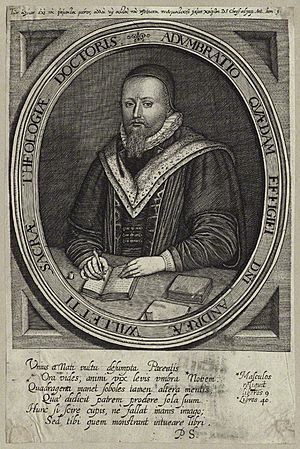Andrew Willet facts for kids
Andrew Willet (born in 1562 – died December 4, 1621) was an important English clergyman and writer. He wrote many books, especially ones that disagreed with the Pope. He was known for his strong beliefs and was even a witness in a famous court case. People who knew him, like Joseph Hall and Thomas Fuller, spoke highly of him and his work.
Andrew Willet's Life Story
Andrew Willet was born in Ely in 1562. His father, Thomas Willet, started as a public notary (someone who can legally witness documents) and later became a priest. He was given a special church position in Ely by Bishop Richard Coxe.
Andrew had one brother and four sisters. After going to school in Ely, he started studying at Cambridge University when he was fifteen. He first went to Peterhouse college, but then moved to Christ's College, Cambridge in the same year. He quickly became a scholar and earned his first degree in 1581. By 1583, he became a fellow (a senior member) at Christ's College. He continued his studies, earning more degrees in 1584, 1591, and 1601.
In 1588, Willet left the university when he married Jacobine, whose father was Roger Goad, a leader at King's College. Andrew Willet became known as a powerful preacher, especially against the Catholic faith. He was chosen to give lectures in Ely Cathedral and later in St. Paul's Cathedral in London.
He became a rector (a priest in charge of a parish) in several places, including Childerly and Gransden Parva. In 1599, he became the rector of Barley, where his father had been. He spent most of his life as a priest in Barley, serving for twenty-three years. He also helped set up a yearly payment for poor students at a local school.
Andrew Willet was a special chaplain and teacher to Henry Frederick, Prince of Wales, who was the son of King James I. Willet often preached in front of the royal court. He got into trouble with the king because he strongly opposed the idea of Prince Charles marrying a Spanish princess. Willet even sent letters to local officials, asking them to protest the marriage. He gave his arguments directly to the king, which made the king very angry, and Willet was put in prison for about a month.
Later in his life, he took on another church position in Reed, Hertfordshire, but he gave it to his eldest son, Andrew, after two years. The year before he died, he also became the rector of a small parish called Chishill Parva.
Andrew Willet died because of an accident. While riding his horse home from London, he was thrown off near Hoddesdon. His leg was broken and was not set properly. Ten days later, on December 4, 1621, he died at an inn. He was fifty-nine years old. He was buried in the church in Barley. His friends and people from his parish placed a statue and a brass plaque over his burial spot.
Andrew Willet's Books and Writings
Andrew Willet wrote many books. His most important work was called Synopsis Papismi, which he published in 1594. This book was a response to another writer, Robert Bellarmine. In his book, Willet tried to show his arguments using the Bible, writings from early church leaders, and decisions from church councils. He also wrote about how the Church of England agreed with the first four important church councils. He strongly argued against certain Catholic beliefs, like the Mass, but he still believed that Jesus was truly present in the sacrament of communion.
One of his earlier works was a book of Sacred Emblems (published around 1591). It was written in Latin with English translations. This book was popular and might have even influenced John Bunyan's famous book, Pilgrim's Progress. Many of Willet's other writings were about current issues of his time. Some of his works were even translated into Dutch.
Here are some of his important works:
- Synopsis Papismi, or a General View of Papistrie (1594): His major work, explaining his views against the Pope.
- Hexapla upon Genesis (1595): A detailed explanation of the Book of Genesis from the Bible.
- Tetrastylon Papismi, or Four Principal Pillars of Papistrie (1596): A follow-up to his Synopsis.
- Harmonie upon 1 Samuel (1607): An explanation of the First Book of Samuel from the Bible.
- Thesaurus Ecclesiae: Exposition of St. John xvii. (1614): This book contained the sermons he gave to his local church members in Barley.
Andrew Willet's Family
Andrew Willet had eighteen children, and thirteen of them (nine sons and four daughters) were still alive when he died. His wife was buried next to him in 1637. One of his sons, Henry Willet, lost a lot of money because he was loyal to the king. Another son, Paul, was allowed to reprint his father's famous book, Synopsis Papismi, in 1630. His fourth son, Thomas Willet, became the very first mayor of New York.
 | DeHart Hubbard |
 | Wilma Rudolph |
 | Jesse Owens |
 | Jackie Joyner-Kersee |
 | Major Taylor |


